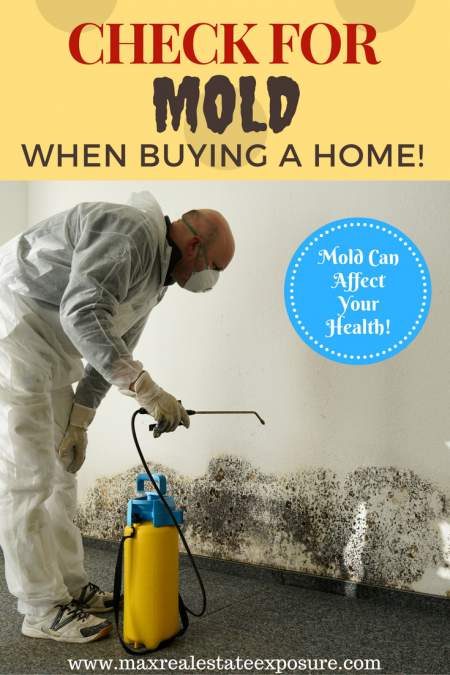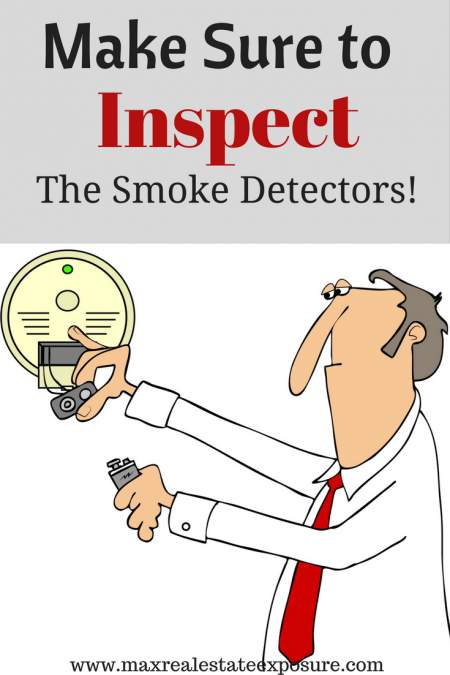House Inspection Checklist For Buyers
 Are you going to be inspecting a house? Having a checklist for home inspections is crucial for a buyer.
Are you going to be inspecting a house? Having a checklist for home inspections is crucial for a buyer.
Inspecting a home is a step in the home-buying process that should never be skipped.
As a real estate agent, one of the questions buyers often ask me is what kind of inspections I should be doing.
Of course, my advice is to inspect everything pertinent to the property.
Inspecting a house is one of the most crucial phases of a real estate transaction.
A home is a significant investment, so it is essential to look at every little detail before you make your purchase.
You can hire a professional home inspector to certify the state of the home you are interested in, so you don’t have to worry about figuring everything out on your own.
However, it is still helpful to have a general idea of what the home inspector will look at so you can follow along.
The more informed you are, the more comfortable you will be discussing the home inspection results for any home you are interested in purchasing.
What is a Home Inspection?
A thorough, professional home inspection is an exhaustive examination of a property by a credentialed expert.
An experienced inspector will devote hours reviewing a property, scrutinizing it, and assessing its present status. The size of the residence and any problems identified may ultimately influence how long it takes to complete their inspection.
As a prospective homeowner, the home inspection is your opportunity to discover potential issues with the property and potentially convince the owner to make repairs or offer a seller concession.
When inspecting a home, if serious problems are revealed, you can back out of the purchase or renegotiate the terms when you have a home inspection contingency in your agreement.
Different home inspection companies offer various levels of service. For example, some inspectors may only do the general building and not provide other services that I will discuss in detail.
Other inspectors offer a full menu of things they will test for, such as radon, mold, water, etc. It is important to ask upfront precisely what you will get for your money.
How Much Do Inspections Cost?
The cost of an inspection can vary tremendously based on your location and the specific services provided.
Having been in the real estate business for the past thirty-seven years, I can say with experience that it’s essential to understand everything to inspect when buying a house.
You will want to know about potential inspection issues before purchasing a home and not after!
We will go over a comprehensive house inspection checklist, so you’re well-prepared before buying a home.
Home Inspection Checklist For Buyers
Many areas will need to be covered when inspecting a property. Due diligence is crucial when purchasing a house. Let’s examine this house inspection checklist in detail.
1. General Home Inspection
A professional inspection is one of the most vital parts of inspecting a home.
The whole home will need to be examined to ensure it is all in good working order. The basics, like the roof, foundation, plumbing, electrical system, and everything else that makes a house a home, will all be covered in a home inspection.
You want to know that the place will be functional when you move in so the home inspector will review it all. Most home inspectors will start with the outside of the building and then head inside after thoroughly investigating the exterior.
Inspecting a house properly takes time. To do a thorough job, the home inspector must be in the house for at least a few hours.
Potential Significant Exterior Issues
Several exterior items should be part of your home inspection checklist. The following items are common problems areas of homes. Inspecting a home should include a more extensive look at these items.
- Wood and trim rot.
- Failing roof.
- Chimney cracking or re-pointing issues.
- Grading problems that are causing potential water penetration.
- Structural issues with a deck or porch.
- Window issues.
- Bulkhead problems.
Once inside, the basement is the most commonplace home inspectors will start their work. The cellar is critical in any house. Basements provide a place for the most prominent potential issues to be discovered.
From experience selling real estate over the last thirty-seven years, I know that over 80% of a home’s significant issues could start in the basement.
If you think about it, most major components are found there, including the heating system, electrical panel, plumbing pipes, foundation, and structural support.
Potential Significant Interior Issues
If I were to put together a house inspection checklist from my experience, it would include the following items. Of course, these items will also be part of any home inspector’s checklist.
- A heating system is past its life expectancy.
- Leaking pipes around the boiler.
- Structural cracks in the foundation.
- Rotting or damaged sills holding up the house
- An air conditioning system is past its life expectancy.
- Electrical issues, including doubt, tapped breakers, grounding issues, and lack of GFCI protection.
- Window or skylight seals that have been broken.
There can be a whole myriad of other issues that can present problems as well. If you purchase a home where the owner has advertised the property as being sold as-is, make sure you are extra careful with getting the most thorough home inspection done.
In many circumstances, properties sold “as is” are almost screaming to you that there are problems.
2. Mold is Present
 When inspecting a house, mold will be one of the primary things a home inspector will look for. Mold freaks home buyers out, which is understandable.
When inspecting a house, mold will be one of the primary things a home inspector will look for. Mold freaks home buyers out, which is understandable.
Every home inspection will include a thorough search for mold, especially when a buyer brings up the fact they have some respiratory issues.
But most new home buyers don’t realize that many homes wind up with mold somewhere.
Anywhere moisture penetrates the home’s shell becomes a prime breeding ground for mold. However, not all mold problems are equal.
If mold is found, it may be a simple fix and something the current owner is glad to take care of. If mold is found – don’t freak out unless the inspector and your Realtor say you should because of the type and severity.
What most people don’t realize is that every home has mold. There are many different types of mold. Some can cause health issues, and others that are very benign.
You should be worried about the most common mold, which, if discovered in a home inspection, is known as Stachybotrys chartarum. This is a toxic black mold that should be dealt with right away.
Mold removal costs can vary dramatically from company to company. I would highly recommend getting multiple bids from professional mold removal companies.
Here is a detailed article worth looking at regarding what you need to know about mold. Any checklist for home inspections should include mold.
3. Radon is at Elevated Levels
Inspecting a home should include checking the present levels of radon.
Radon is a radioactive material that can be distributed in the soil below and surrounding a home. The radon can pose a health hazard to the home’s inhabitants if the concentration is strong enough.
Because of the home’s enclosed structure, the radon can become trapped, and those in the house can be exposed to such a degree that they are endangered. Radon exposure happens over an extended period of living in the home.
A radon inspection will check on the levels of radon in the air. If radon is present and is a concern, some things can be done to remediate the home to safe levels. US EPA has set an action level of 4 pCi/L. The EPA suggests taking corrective measures to reduce your exposure to radon gasses at or above this amount.
Remediation of radon in the air is relatively easy to do. Some companies specialize in doing so. A PVC pipe is run through the basement floor up and out of the home’s roof. A fan is attached to the pipe that creates a vacuum and draws the radon up through the pipe and out of the house before it can ever get inside.
Most radon removal specialists guarantee they will reduce the levels below two pCi/L by installing a radon mitigation system. Removing radon costs between $1000-1500 in most places.
Radon Can Be Found In Water Too
You should also be aware that it is possible to have radon in your water if you are serviced by an artisan well. Removing radon from water is far more expensive than in the air.
Removing radon in water can run you about 5000-6000 dollars on average. Two methods of removal are discussed in the referenced article. When inspecting a home, radon should be added to the list of things to check.
4. Pests, Rodents, and Insects
 Another common issue to check for when inspecting a house is pests or rodents. It can be expected in older homes to find yourself dealing with the occasional mouse or ant problem.
Another common issue to check for when inspecting a house is pests or rodents. It can be expected in older homes to find yourself dealing with the occasional mouse or ant problem.
But a few mice or some ants in the sugar are a far cry from an actual pest or insect infestation.
Some homes have serious problems, problems you need to know about before you move in.
Termites, for instance, can ruin the structure of a home if left unaddressed. Orkin has some great information on how to identify termites worth checking out.
The home you are buying could have a significant problem with bats in an attic. If you don’t like bats, you’d want to know about such a problem.
You will probably never know when you don’t have a professional inspection.
5. Lead Paint is Present
When purchasing an older home and having young children, checking for lead paint should be on your inspection checklist.
Older homes will commonly contain lead paint. While the paint doesn’t pose a danger unless you ingest it, the current owner is still legally obligated to inform you of the presence of lead paint.
If you plan on having children in the home, you want to know about the paint issue. The home inspector will verify whether lead paint is present and will let you know either way.
Lead paint is the only federally mandated item that all sellers must disclose to buyers. Every state differs other than lead paint on what must be disclosed when selling a home. Real Estate agents are also held to a different standard than homeowners regarding disclosure.
6. Well Water, if Not Public
When inspecting a home, it’s crucial not to forget about checking the water source.
If the home you are interested in gets its water from a well, the inspection must include a careful look at the well’s present condition. You should be aware of the quality of the water and the flow rate before purchasing the home.
Failing to look closely at the well can put you in a bad position as a new homeowner. New wells are expensive to drill, so you want to ensure that the existing well is good. The well is an inspection item often overlooked by many home buyers.
Not testing a well is a big no-no and could come back to haunt you. Don’t assume you have a great well if you have good water pressure from the faucets. That is not the case!
7. The Septic System Should Be Inspected
Septic systems must be carefully managed if they continue to handle the waste produced by the home. When you buy a home, you want to know that the septic system is working correctly because fixing or replacing such a system is costly.
Here in Massachusetts, we have a regulation known as Title 5. Title 5 requires owners to get their septic system tested before selling to a buyer. Replacing a septic system is very expensive, so you must ensure it functions properly.
Homebuyers cannot get a loan without passing Title V. When purchasing a home, you should carefully review the Title 5 septic report.
One area that should concern buyers is the “bedroom capacity” the system is rated for. For example, the system could be rated for three bedrooms.
If your system has a capacity for three bedrooms, the home should not be marketed as a four-bedroom, even if four bedrooms exist in the house!
8. Smoke and Carbon Monoxide Detectors
 Laws can differ depending on where you are buying, but in many places, there are requirements for smoke and carbon monoxide detectors in any home being sold.
Laws can differ depending on where you are buying, but in many places, there are requirements for smoke and carbon monoxide detectors in any home being sold.
An inspection will examine existing detectors and their functionality and list the need for any new detectors based on current regulations.
Again, here in Massachusetts, the seller must provide the buyer a certificate at closing saying there are working smoke and carbon monoxide detectors in the home.
The certificate is granted by the local fire department, which inspects the detectors.
You can read about the Massachusetts carbon monoxide and smoke detector law here. Once you own the home, it will be your responsibility to keep them in working order.
Determining how the state you purchase in handles its detector laws is crucial.
9. Miscellaneous Things to Have on Your House Inspection Checklist
A few other things should be on a buyer’s home inspection list, including the following:
Asbestos
Like lead paint, asbestos was used in homes for decades. The material is highly fire retardant and was commonly used as insulation in older homes.
Unfortunately, when disturbed – such as when people are wandering around the attic or installing new insulation – the fibers in the asbestos can become airborne and be inhaled.
The barbs on the fibers can become stuck in the lungs and lead to cancer many years later. Your inspection should inform you if the potential for asbestos is present.
The barbs on the fibers can become stuck in the lungs and lead to cancer many years later. Your inspection should inform you if the potential for asbestos is present.
I mention “potential” because you cannot say for sure a material contains asbestos unless it is sent to a lab and tested.
Many homeowners will choose to leave asbestos as is because it only presents a danger if disturbed, and replacing it can be expensive. But whether you leave it alone or replace it, you need to be aware of its existence in your home.
Any Other Toxic Materials
Lead paint and asbestos are the most common toxic materials found in older homes, but they are not the only materials in a home you want to purchase. The home inspector will look for any other toxic materials you should be concerned with before buying the home.
Understanding The Home Inspection Report
After your home inspection, the inspector will give you a written report detailing all the issues.
If the inspector discovers a host of significant problems or an unexpectedly lengthy list of minor issues, you might want to reconsider your decision to purchase the property.
Sometimes the issues are not as bad as they seem from the report. Inspection reports tend to make issues look more ominous than they are.
Investigating these problems with a qualified contractor will likely help determine whether you want to proceed with the purchase. Backing out of the purchase due to the inspection could be an option you later regret.
No home is perfect, and many can be improved to your satisfaction.
Review Your Checklist For Home Inspections With Your Agent
With your inspection report and checklist in hand, the last step will be to review it with your buyer’s agent. Of course, doing so will only happen if you wish to proceed with the transaction.
It will be essential to pick and choose your battles wisely. Don’t expect the seller to fix every issue, especially in a seller’s market. The focus should be on the most significant items of health and safety.
The inspection isn’t an opportunity to give the seller a punch list to make the home perfect. There are no mandatory home inspection fixes, so it will be at the owner’s discretion. The best outcomes happen when both parties are reasonable.
Final Thoughts on Inspecting a House
Understanding the current state of the home you are buying is essential. Even if you are pretty confident, there are no significant issues; a home inspection is an excellent opportunity to learn about the property’s inner workings.
They are a great educational experience if you hire an excellent inspector. Always do your due diligence.
When it comes time to negotiate items found during the inspection, make sure your requests are reasonable. Don’t expect the home to be perfect. That is not why you are doing an inspection.
Consult with your real estate agent about how to go about negotiating inspection problems. Always remember what you are buying. All homes have flaws, and the seller’s job is not to provide you with a 100 percent issue-free dwelling.
Hopefully, you now better understand inspections when buying a home.
Additional Home Inspection Articles Worth a Look
- The importance of a home inspection – see why inspecting a house is so critical, especially when it is older or there are readily apparent issues.
- Problems the home inspector may miss – when buying a home, it is essential to understand that there are some problems a home inspector may not be able to find in their limited time in the property.
- Common home inspection issues to observe – do you know some of the more common home inspection problems? Find out in this insightful article.
Use these additional home inspection references to make sound decisions when purchasing a home.
About the Author: The above Real Estate information on the house inspection checklist for buyers was provided by Bill Gassett, a Nationally recognized leader in his field. Bill can be reached via email at billgassett@remaxexec.com or by phone at 508-625-0191. Bill has helped people move in and out of many Metrowest towns for the last 37+ Years.
Are you thinking of selling your home? I am passionate about real estate and love sharing my marketing expertise!
I service Real Estate Sales in the following Metrowest MA towns: Ashland, Bellingham, Douglas, Framingham, Franklin, Grafton, Holliston, Hopkinton, Hopedale, Medway, Mendon, Milford, Millbury, Millville, Northborough, Northbridge, Shrewsbury, Southborough, Sutton, Wayland, Westborough, Whitinsville, Worcester, Upton, and Uxbridge MA.


Bill, thanks for sharing great content. Making a checklist for inspection would help newbies. One can search online to find a good home inspection checklists, these can be customised to meet requirements of the state. The checklist is very useful if one interacts with home owner directly esp. probates and foreclosured properties.
Simple to read and appreciated have a great one, Bill !
This is a great list, thanks Bill! Radon is very common in my area and too often I have seen people purchase homes without doing these types of inspections and run into a ton of issues that could have been avoided.
Home inspections are an important part of buying a home. It’s always better to be safe than sorry and like you said it’s good to know the home you’re buying. Great post Bill!
Thanks for the good read Bill. I totally agree home inspections aren’t ,make or break. The buyer must simply decide if they can still go forth with the investment.